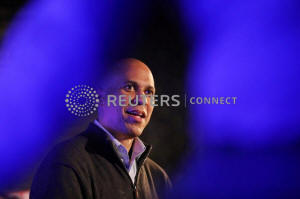|
Democrats swear off big money, but will
it hurt their 2020 White House chances?
 Send a link to a friend
Send a link to a friend
 [February 14, 2019]
By Amanda Becker [February 14, 2019]
By Amanda Becker
WASHINGTON (Reuters) - Senator Elizabeth
Warren issued a pointed campaign finance challenge to fellow Democratic
U.S. presidential contenders at her official 2020 White House election
launch.
"I'm not taking a dime of PAC money in this campaign. I'm not taking a
single check from a federal lobbyist. I'm not taking applications from
billionaires who want to run a Super PAC on my behalf. And I challenge
every other candidate who asks for your vote in this primary to say
exactly the same thing," Warren said during her rally last Saturday in
Massachusetts.
Warren's move regarding money from lobbyists and political action
committees (PACs) - entities formed by corporations, unions and others
to raise and spend money to back or oppose candidates - highlights the
tricky role money is expected to play in a Democratic primary battle
that could draw dozens of candidates vying to challenge Republican
President Donald Trump.
The Democratic candidates are expected to push one another to show their
commitment to getting big money out of politics, following the lead of
Democrats who helped the party retake control of the U.S. House of
Representatives from Trump's fellow Republicans in last year's
congressional elections.

Many Democrats have decried the influence of money from corporations and
wealthy individuals on elections. But some strategists worry that the
candidates could go too far and hamper the party's chances in the
November 2020 general election by giving a financial edge to the
Republicans.
All of the Democrats who have launched a 2020 campaign or are formally
considering a run have sworn off accepting corporate PAC money, campaign
contributions that are pooled by corporate fundraising committees.
Some of the 2020 contenders are taking the pledge a step further by
promising to reject donations from registered lobbyists and other PACs,
while discouraging support from some types of so-called Super PACs that
can raise and spend unlimited sums.
Senators Kamala Harris of California, Cory Booker of New Jersey, Kirsten
Gillibrand of New York, Amy Klobuchar of Minnesota and Warren of
Massachusetts will not accept donations from registered lobbyists,
according to the candidates and campaign aides. The campaign of former
U.S. Housing and Urban Development Secretary Julian Castro, a Texan,
already has returned money to several lobbyists, an aide told Reuters.
Most of the candidates, including Klobuchar, Harris, Booker, Gillibrand,
Warren and Castro, have said they also will discourage single-candidate
Super PACs from operating on their behalf, though they cannot prevent
them from doing so.
During Booker's first campaign swing through Iowa, the state that holds
the first party nominating contest in early 2020, he said he was
frustrated that a donor had started a Super PAC on his behalf, and he
did not want its support.
"My campaign is going to be run by the people," Booker said. "We're
going to power this election principally by low-dollar contributions."
'HAND-WRINGING IN WASHINGTON'
Legally, Super PACs are supposed to operate independently of candidates
and cannot contribute to them directly. In reality, they often are run
by donors close to the candidates and their campaigns.
[to top of second column]
|

U.S. Senator Cory Booker (D-NJ) speaks during his 2020 U.S.
presidential campaign in Des Moines, Iowa, U.S., February 9, 2019.
REUTERS/Scott Morgan/File Photo

David Donnelly, president of Every Voice, a campaign finance watchdog
group, said candidates are smart to "think twice about winking and
nodding at the Super PACs that are set up for themselves." They "may be
more of an albatross than a benefit" with Democratic primary voters,
Donnelly said.
Promising to reject all Super PAC support, however, could cause
consternation. Super PACs supporting Trump, the presumed Republican
nominee, have continued raising money throughout his presidency.
Donnelly said that "you'd see a lot of hand-wringing in Washington about
a candidate" who would forsake any Super PAC support, saying such a
stance could be read as a "signal you're not serious about winning."
Money is spent by the millions of dollars in presidential races. With
donations to candidates from PACs capped at $5,000, these entities play
an insignificant role in these elections.
In contrast, Priorities USA Action, which is the largest Democratic
Super PAC and is not tied to a specific candidate, spent more than $190
million to help Democrat Hillary Clinton's 2016 presidential campaign,
according to data from the Center for Responsive Politics, which tracks
money in politics.
It is not yet clear if a Democrat would discourage the support of Super
PACs like Priorities once becoming the party's nominee. Priorities is
remaining neutral in the primary battle but likely will have hundreds of
millions of dollars at its disposal for the general election.
Gillibrand told reporters she did not think individual candidates should
have Super PACs but did not weigh in on Super PAC support more
generally. The Harris campaign told Reuters she "rejects Super PAC
activity" but did not specify whether that extended to groups like
Priorities.
The campaigns of Warren, Booker and Klobuchar likewise did not respond
directly to questions from Reuters about how they would handle support
from such entities. Castro's campaign said he would discourage all Super
PAC activity.
Foregoing big money groups will put more focus on a Democratic
candidate's ability to attract large numbers of small-dollar donations.

Klobuchar's campaign said it raised more than $1 million from "online
and grassroots supporters across the country" in the 48 hours after she
announced her candidacy on Sunday.
Supporters who heeded Klobuchar's call to "text Amy" received this
reply: "This team is powered by YOU (i.e. NOT Super PACs). Chip in now
to help support this movement."
(Reporting By Amanda Becker; Editing by Colleen Jenkins and Will Dunham)
[© 2019 Thomson Reuters. All rights
reserved.]
Copyright 2019 Reuters. All rights reserved. This material may not be published,
broadcast, rewritten or redistributed.
Thompson Reuters is solely responsible for this content. |